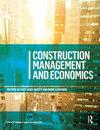Compound deferrable options for the valuation of multi-stage infrastructure investment projects
IF 3.3
Q2 BUSINESS
引用次数: 1
Abstract
Abstract Multi-stage planning is common for expanding infrastructure complexes or networks. Previous real-option studies developed a sequential compound call option (SCCO) for evaluating multi-stage infrastructure investment projects, including evaluating abandonment options during individual pre-scheduled investment stages. In practice, however, investment schedules involve risk and uncertainties forcing investors to change plans, raising an important issue regarding investors having more options at each commencement date. This study introduces a new model, the sequential compound deferrable call option (SCDCO), incorporating deferment options for each fold in an n-fold setting and generalizing the exercise of each deferment option into mn periods. A closed-form solution to the valuation of SCDCO is derived accordingly. A real-world case demonstrates that introducing deferment options increases project value, but the marginal benefit of increasing deferment time diminishes. The presence of dedicated assets for the usage of future expansions can also increase project value, but this increase is restricted by deferment options. Furthermore, the investment cost growth with an increase of deferment time rapidly decreases project value and vice versa. Inflation or deflation is therefore important to consider in deferment decisions. Finally, although deferment options only produce limited project value, they have the flexibility to manage risks, changes, and budgetary constraints.多阶段基础设施投资项目估值的复合可延期权
摘要多阶段规划对于扩展基础设施综合体或网络来说是常见的。先前的实物期权研究开发了一种顺序复合看涨期权(SCCO),用于评估多阶段基础设施投资项目,包括评估各个预先计划的投资阶段的放弃期权。然而,在实践中,投资时间表涉及风险和不确定性,迫使投资者改变计划,这就提出了一个重要问题,即投资者在每个开始日期都有更多的选择。这项研究引入了一个新的模型,即顺序复合可延期看涨期权(SCDCO),将n倍设置中的每个倍的延期期权合并在一起,并将每个延期期权的行使概括为mn个周期。据此导出了SCDCO估值的闭式解。一个真实的案例表明,引入延期选项可以增加项目价值,但增加延期时间的边际效益会减少。用于未来扩建的专用资产也可以增加项目价值,但这种增加受到延期选项的限制。此外,随着延期时间的增加,投资成本的增长会迅速降低项目价值,反之亦然。因此,在作出延期决定时必须考虑通货膨胀或通货紧缩。最后,尽管延期方案只能产生有限的项目价值,但它们具有管理风险、变更和预算限制的灵活性。
本文章由计算机程序翻译,如有差异,请以英文原文为准。
求助全文
约1分钟内获得全文
求助全文
来源期刊

Construction Management and Economics
BUSINESS-
CiteScore
7.50
自引率
14.70%
发文量
58
期刊介绍:
Construction Management and Economics publishes high-quality original research concerning the management and economics of activity in the construction industry. Our concern is the production of the built environment. We seek to extend the concept of construction beyond on-site production to include a wide range of value-adding activities and involving coalitions of multiple actors, including clients and users, that evolve over time. We embrace the entire range of construction services provided by the architecture/engineering/construction sector, including design, procurement and through-life management. We welcome papers that demonstrate how the range of diverse academic and professional disciplines enable robust and novel theoretical, methodological and/or empirical insights into the world of construction. Ultimately, our aim is to inform and advance academic debates in the various disciplines that converge on the construction sector as a topic of research. While we expect papers to have strong theoretical positioning, we also seek contributions that offer critical, reflexive accounts on practice. Construction Management & Economics now publishes the following article types: -Research Papers -Notes - offering a comment on a previously published paper or report a new idea, empirical finding or approach. -Book Reviews -Letters - terse, scholarly comments on any aspect of interest to our readership. Commentaries -Obituaries - welcome in relation to significant figures in our field.
 求助内容:
求助内容: 应助结果提醒方式:
应助结果提醒方式:


